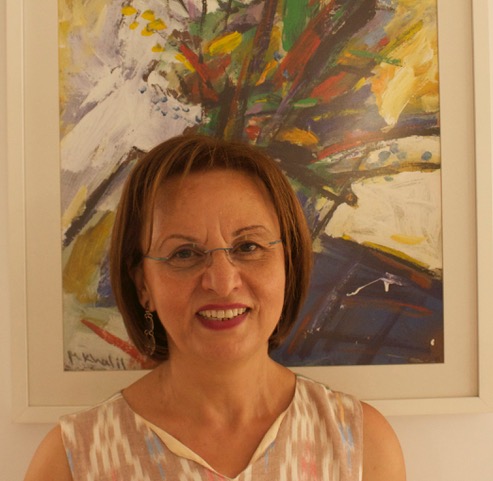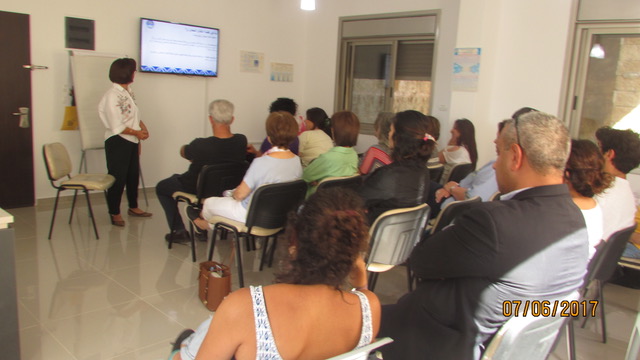Finding Calm in a Conflict Zone

Living in an occupied country takes its toll. Basma Abu Sway, an Arab living in Palestinian Jerusalem, describes the mounting tensions in her community and country.
“When you walk in the streets you feel the high stress,” says Basma. “Everyone is tense. People can fight for sometimes silly reasons. Because everyone lives under high tension, people don’t feel safe, they don’t feel secure. So this is really affecting our lives.”
As a mother of four, a grandmother of two, and a career woman, Basma sought relief from the constant pressure. “In 2013 I was going through a very difficult time in my life and in my job,” she remembers. “I was facing a lot of challenges, and it was stressful. In addition to that, two close people in my life, my best friend and my brother-in- law, were struggling with cancer and I was very involved with their care.”
Even after becoming a yoga teacher and practicing other forms of meditation, she was still in search of help for her stress and grief. Then a friend suggested that she learn the Transcendental Meditation (TM) technique.
“It was something like magic happening to me,” says Basma. “It was a powerful experience. I cried a lot. Before, I hadn’t been able to cry as I wanted to be very strong.”
Basma says from the very first meditation she felt tremendous relief, “because I had a lot of anger inside me, and TM helped me to release it. I felt more inner peace. Now I’m much easier on myself and others. It’s much easier for me to forgive. I am more tolerant. With TM my heart is more open.”
Helping Others to Experience Inner Peace
When Basma started practicing TM, she was near the end of a long career in social services. After earning an MA degree in Rural Sociology and Community Development at Iowa State University in Ames, Iowa, she first started in research. Then she became the general director of the family and children department in the Palestinian ministry of social affairs and was responsible for women and child protection. Later she worked with international organizations that researched community development and management.
Basma says that her TM practice helped her to think more clearly about her priorities, “to understand who I am and what I want to do in my life.” She decided to train as a teacher of Transcendental Meditation and help others experience the same relief that she had experienced. In 2016 she became the first TM teacher in Palestine and now teaches in the city of Ramallah.
Her work as a TM teacher brings her great joy. “I recently taught a young lady who said she has always been worried without any reason, and that she couldn’t sleep. She had a deep, peaceful experience in her very first meditation. It made me feel that I was doing something really significant to help this girl.”
Basma says that most of the people she teaches are women. “Women pay the price of conflict more than anyone else,” she says. “We are the ones taking care of the family. We are also working outside the home—we participate in bringing food to the table. When a loved one is arrested or killed, we take a lot on our shoulders as women, as mothers, as wives, as human beings.”
And consequently, every woman needs the TM technique, says Basma. “When most women go to bed, it is as if they have no energy left because they run all day to serve others—their children, their husbands, their work. It’s hard for women to find time for themselves. TM is really important for all women. It allows you to sit for some minutes in the morning and the afternoon with yourself and to take care of yourself. And it gives you more energy to love others.”
The Power of Meditating Together

When groups of people practice the TM technique together, they almost always comment that they have a deeper, more peaceful experience. This phenomenon is not just an anecdotal description: it is backed by research. The peaceful and calming effect of TM starts to be experienced by people in the surrounding area—even if they don’t practice the TM technique.
A study published in the Journal of Conflict Resolution demonstrated that when 200 people were practicing the TM technique and the advanced TM-Sidhi program together in Jerusalem for many months in 1982, it had a calming effect on the entire region, as evidenced by a decrease in crime, car accidents and fires in Israel—and war deaths in nearby Lebanon.
Since December of 2017, many countries in the Middle East and Europe are participating in Middle East Coherence Days, which are held once a month. People from 12 different countries in the Mideast and beyond gather at the same time in their own TM centers, in their own countries, to meditate together to bring coherence and peace in the Middle East.
For instance, Basma explains that she and the people who practice the TM technique in Ramallah meet for a whole day session, practicing their TM program together as a group in the morning and the evening, with a program of speakers in the middle.
“We meditate, we discuss the knowledge we learned, then we share food together in the center,” she says. “Everyone around the region and the world who is participating on this day are joined together in a Skype call.”
The main purpose is to meditate all together, at the same time, to bring coherence and peace to the Middle East.
“I always encourage people to come because the bigger the group meditating together, the more it will help to bring peace first to us as individuals, then our families and neighborhoods, our city and our country,” says Basma.
She adds, “As Palestinians, what we need is to enjoy inner peace, each one of us. We need to feel peace within ourselves and then within our families. To feel safe. This is what we need first—and then to build this peace in the environment around us. This is my aim of teaching TM in Palestine, and this is what TM can really help with.”
About the Author
Linda Egenes writes about green and healthy living and is the author of six books, including The Ramayana: A New Retelling of Valmiki’s Ancient Epic—Complete and Comprehensive, co-authored with Kumuda Reddy, M.D.
More Posts by Linda
- Tired and Burned Out? Transcendental Meditation Can Help: An Interview with Dr. Nancy Lonsdorf, MD
- Worried About the Future? Six Ways to Calm Your Anxiety
- What Do You Carry in Your Self-Care Tool Kit?
- Five Strategies for Family Caregivers
- From the Streets to College in Four Months: The Communiversity of South Africa Empowers Underserved Youth in Cape Town





